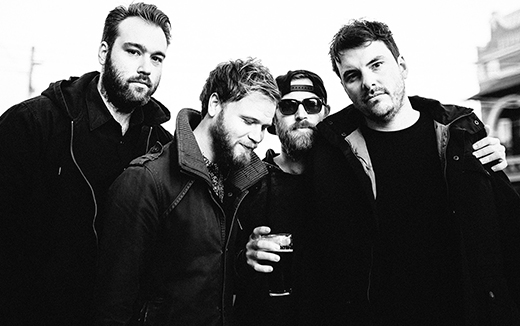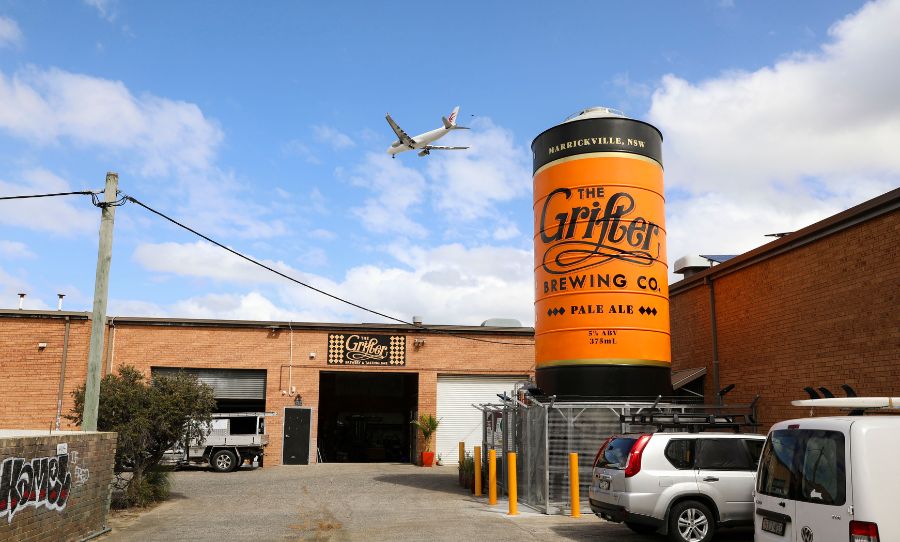Following his career as a solo musician Alastair Cairns has shifted gears and formed his new band Wells. Armed with a brilliant debut EP and a newfound sense artistic purpose, the boys gathered with beers in hand to chat about The Pale King.
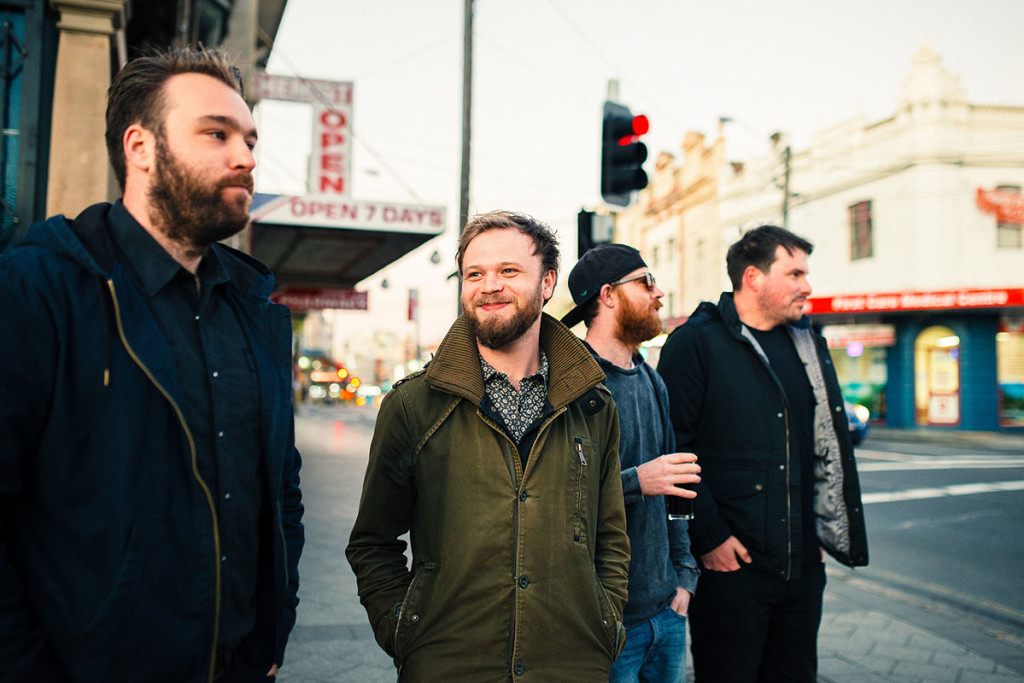
Photos by Liam Cameron
HAPPY: A lot of people know Al from his time performing as Atlas B Salvesen, what was the journey from there to get to the point where a new band was formed for Wells?
ALASTAIR: Some of these guys played with me when I was doing my solo stuff, and it got to a point where it didn’t feel like the name fit anymore. It felt like a band more than a solo project. It was a natural progression to change over.
RICHARD: I think it was always the plan to get the band together at the end of last year. We all just sat around and drank heaps of whiskey and decided to make it a band rather than Al just play the acoustic stuff.
ALASTAIR: There were a new bunch of songs that I’d just written and I was demoing them in my room. In my head when I heard these songs I knew they had to be done by a band. It was no longer something that could be achieved by one person. That’s when we all got together and said “Let’s do this“.
DAN: I think the major point was when Al shared the concept with us for the new songs. We all just took ownership of them from that point onwards. We all shared that story. I guess beforehand we were just helping out but now we all have this ownership of the songs and the band. That’s when it felt like we had it for me, when we got the book!
ALASTAIR: The manuscript! (laughs)
HAPPY: Has there been a shift in the dynamic between you guys since that moment, or has it more or less stayed the same?
RICHARD: There’s a lot of difference, I guess, pathways happening within the band. It’s slowly moving into all of us coming together and writing some stuff together. Originally it was all Al’s songs. This idea and the story of the Pale King that he wrote; that’s what we focused on with these four songs from the EP, this story of the Pale King. There’s a lot of new stuff emerging, a lot of new sounds emerging. It’s starting to grow a lot more with everyone’s tastes morphing into the band’s sound. It’s getting really good. I’m really stoked from last rehearsal, it’s sounding really good. I think it’s good for all of us.
DAN: And we’ve had more experience together as well. We’ve recorded together as a band, it wasn’t a solo recording, it was fully band oriented. Just by doing the gigs and the recording and all of us putting our stamp on it, it really galvanised it.
ALASTAIR: There was a massive difference in the recording process. All the work I’d done before this project, each individual part was tracked differently. I’d never recorded live, and this was all tracked live with minor over-dubs added over the top. So it really felt like a band coming together to create a record rather than this project of one person’s vision being helped by other people.
HAPPY: I really like that concept of the Pale King, are any of you David Foster Wallace fans?
ALASTAIR: The name The Pale King was something that was possibly inspired by David Foster Wallace, however in what I was getting at shares no inspiration whatsoever with that book. It was imagery that came into my head, maybe it was subliminal. But the storyline I wrote for the songs was very, very different. Really the story was about a failed folk singer who developed a split personality which they felt could get them success and tragedy ensues. It doesn’t have a whole lot of working in a post office.
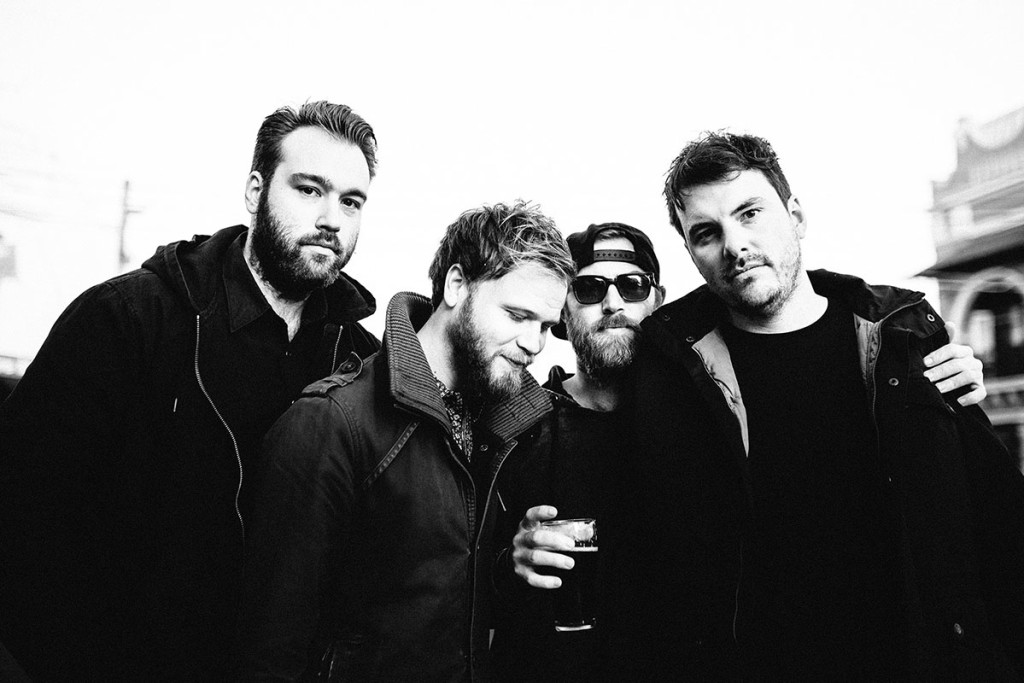
RICHARD: It’s a very small snippet the EP. I think there were 12 songs written about the story of the Pale King, with the intention of it being an album. But maybe one day it will be.
ALASTAIR: We really wanted to create a snapshot into that world and the emotions behind each of the songs work as their own small story I feel, but there is a lot of references between the songs that work, there are a lot of characters that are reoccurring.
HAPPY: There are definitely those feelings of someone trying desperately figure themselves out when you listen to it. There’s a lot of dark imager in that respect. Do any of you guys consider yourselves a dark person?
RICHARD: Al is a dark person (laughs), just listen to those lyrics.
ALASTAIR: I don’t think I’m necessarily a dark person all the time, but I think I’m a dark writer. When I’m writing I’m alone in my room, stewing with my own thoughts usually, so that’s when some of the more negative thoughts come to me. It’s weird, I wouldn’t say I enjoy writing about it, but it’s something I’m drawn to write about it.
HAPPY: Why do you say you’re drawn to it? What brings that on?
ALASTAIR: Everybody is fascinated by the human condition, and I’ve always been drawn to the things that are almost forbidden, the things that people don’t talk about so much. I’ve always romanticised that in my head and I take great interest in that. I love horror fiction, that’s maybe part of it. But I’ve always been fascinated by what’s in your everyday life.
HAPPY: And now he’s drawn all of you guys into it as well!
ALASTAIR: (Laughs)
RICHARD: He’s got a big flavour for Greek mythology as well. It’s pretty heavy in the songwriting, which I like. It makes a good story.
HAPPY: And you only had 12 tracks written, so what made you choose these 4 for the EP?
DAN: In a practical sense, we gigged a lot of those songs for a year, and they definitely felt like the stronger candidates to have a snapshot of this world.
RICHARD: They were definitely the most developed songs and were the standouts for what we were doing live.
JOSH: I think they were the ones that came together best as well from our songs by themselves to the band project. They just fell into a good rhythm and that worked for us.
ALASTAIR: There were some songs that were part of that original 12 that were 9 minute epics. An EP should really be a punch in the face for what you’re all about. With 9 minute songs like that it’s fantastic and can be immersive but it doesn’t have the same effect that we wanted to create with this EP.
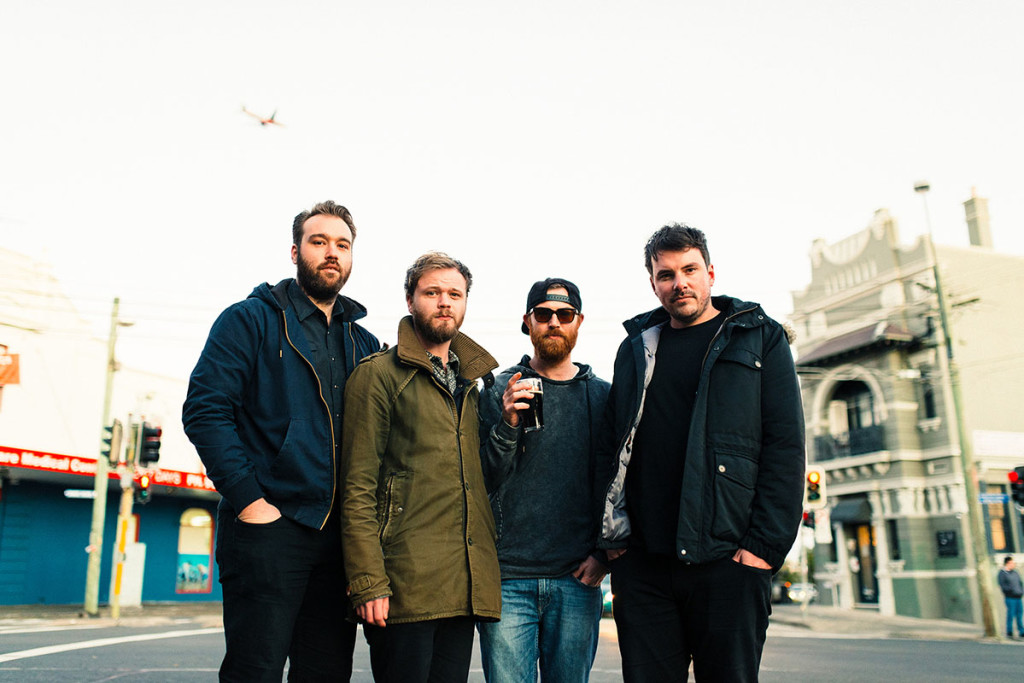
HAPPY: And you guys also worked with Tony Buchen, who also worked on Spookyland’s EP last year. How was it working with Tony at Albert’s?
DAN: It was good! Yeah, intense! Just by the nature of the recording of one week of immersion into that world. He’s a really strong producer, and we were totally in that world for that period. For the amount of preparation we had and that brief introduction it was really the bets we could have hoped for. I don’t know how it could have worked out nay better really. It was a very brief but intense time, and I think we all learned a lot as a band and we came out of it feeling really strong as a band.
JOSH: It’s just cool to have that ear. When you’re writing music all together it’s different to having someone listening in, and having ears that are educated and good, it changes the way you play and the intensity you bring to the performance.
DAN: His ideas were really tasteful and really brought the best out of us. To combine a group of people he doesn’t know and to make something out of it, that’s really great.
HAPPY: Was there anything in particular you felt he was able to get out of you guys?
ALASTAIR: One thing we wanted to achieve with the sound was to give it an ethereal, dream-like sort of sound. He added a lot to that. He had a lot of ideas, and instruments that he brought along which we used that really helped with that. We were able to use the studio as an instrument, which none of us would have known how to do at that point. We were able to achieve something there which we wouldn’t by ourselves in another studio.
HAPPY: You say play the studio as an instrument, what does that mean?
ALASTAIR: As someone who doesn’t produce records I’d call it knob tweaking (laughs). Fantastic knob tweaking!
JOSH: Are you talking about all the effects we used? We used a whole bunch of reverbs and used kit that none of us would have been able to afford.
RICHARD: We had the benefit of recording with some really nice gear that none of us had. We might be able to use it well but we don’t have any of it, so Tony just brought the goods really. He’s well familiar with that studio, he works in there all the time. He knows how to pull great sounds with the drums and use really nice effects to build up the atmosphere.
HAPPY: Al you mentioned before you’re a fan of horror fiction. I remember the first image of Wells I saw was your Facebook cover photo of this Creature from the Black Lagoon monster.
ALASTAIR: That was Swamp Thing, an old, old comic. Alan Moore recreated that comic in the 80s and the art is phenomenal. I’m a big fan of that kind of stuff. I like Alan Moore as a writer
HAPPY: Totally, Watchmen is the best!
ALASTAIR: Yeah it’s fantastic. But I don’t feel like the Swamp Thing (laughs).
RICHARD: I feel like the lady in the Swamp Thing’s arms sometimes, getting carried off. I don’t know where I’m going but I’m taking a ride.
DAN: What, in Wells?
RICHARD: Just in life (laughs). Where am I going? I don’t know but it’s happening?
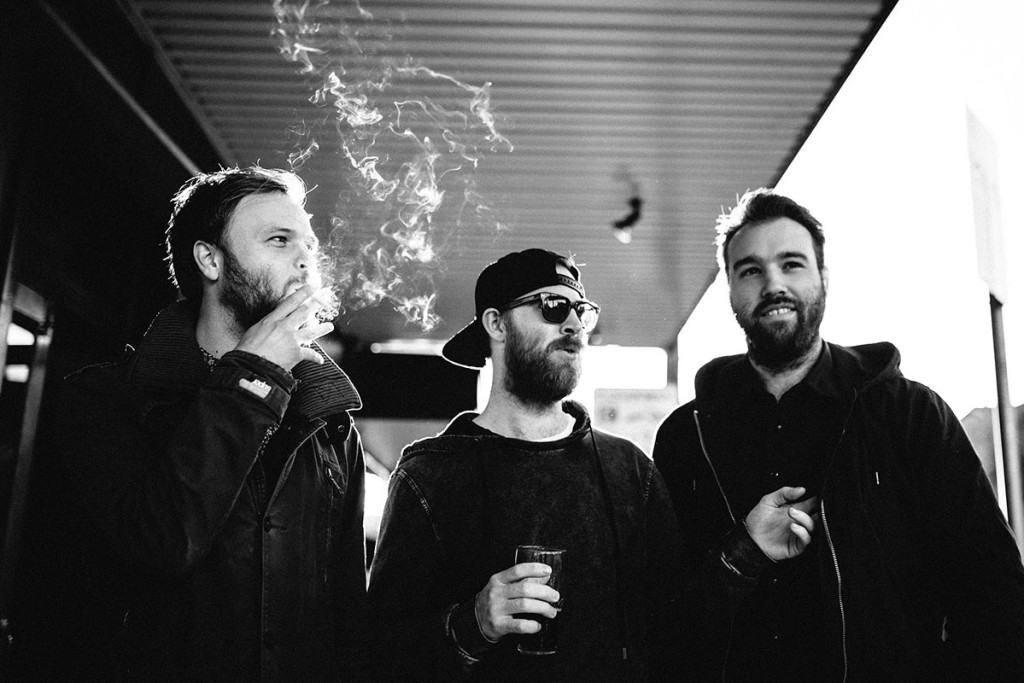
HAPPY: The reason I asked was because I wanted to know what your take on social media was, especially as a new band establishing yourselves. Is there anyone in the band who has that job?
RICHARD: What is Instagram? I don’t know man, social media is a cruel beast. You have to just pour hours of your life to get the followers. Although it’s important in this day and age, but at the same time I feel it’s a cheap way to get fans so people think you’re cool.
DAN: (laughs), Yeah I’m a novice!
ALASTAIR: Social media is like this ginormous beast you have to play with at some point in you career. It’s too big to ignore. But as Richard said, if you’re spending hours on it trying to win fans I’d much rather be writing a song. Sometimes it’s the enemy of the muse. That in some way art and it’s relationship with fame…
RICHARD: It’s why you pay other people to do it for you, so you don’t have to feel guilty about it.
JOSH: I hear a lot of music from social media though. I’ll still find out more about it from reading Facebook comments and stuff like that. Record stores aren’t where people gather these days, you can gauge what people are thinking via social media. It’s definitely important.
DAN: It’s the ultimate reputation based environment. You have to curate the environment of people you respect. For bands I guess you have to be one of those guys, someone people want to follow.
RICHARD: Follow me please! Oh follow me!
JOSH: I think of it more in terms of engaging and relationships, not followers.
RICHARD: Yeah man, it’s all about the numbers game. It’s not about how much you respect these people it’s about getting someone to give you money for the amount of followers you have.
ALL: (laughing) What?
RICHARD: Oh you’ve got 10 000 followers, can we advertise something?
DAN: But you have artists you respect that you follow right? When they post something you at least look into it.
RICHARD: I do. I’m just talking about playing the game to get the numbers to be a valid artist. To me it’s just bullshit. Anyone can do it if they spend the time. Of course you have good material to back that up. It just seems like a cheap avenue to provide the success, when really the material should be providing the success. And the intention.
HAPPY: So I guess Richard isn’t allowed near Wells’ Facebook then?
ALL: (laughs)
HAPPY: Well we’re getting close to the end so I want to ask the final question. At Happy we always talk about what makes us happy, so what makes you guys happy?
RICHARD: Sushi train and a Sapporo. Also playing onstage.
DAN: Ah, someone else, I need to think of something first!
ALASTAIR: The feeling I get when I finish a song, it’s probably the single greatest feeling I get, and I wish it would happen more often (laughs).
DAN: What makes me happy?
RICHARD: Board games, video games, skiing! Oh my God, take me back to the mountain!
DAN: Good stories, good art.
JOSH: Things that are inspiring. And like Richard was saying, trying to ignore the dumb things and just go for it. That’s what I like, seeing people who just go for it. People who are true to themselves.
